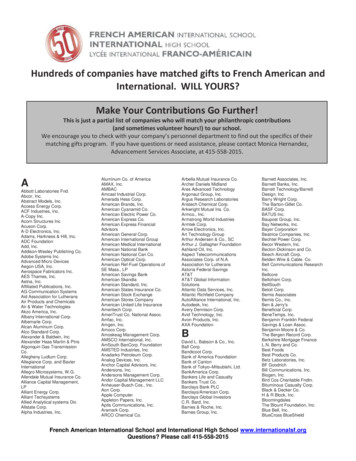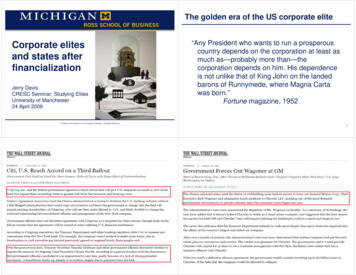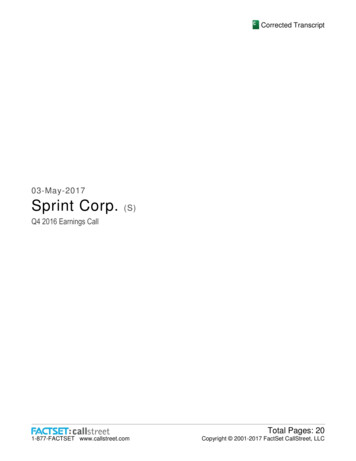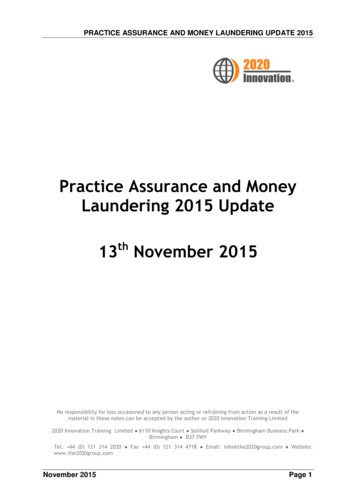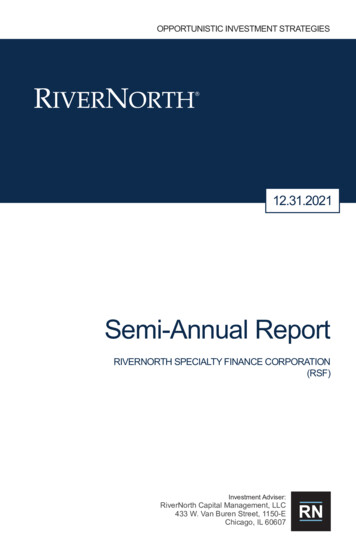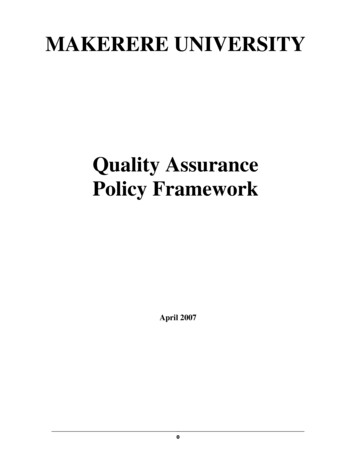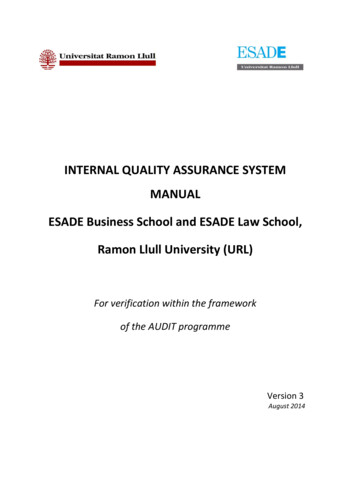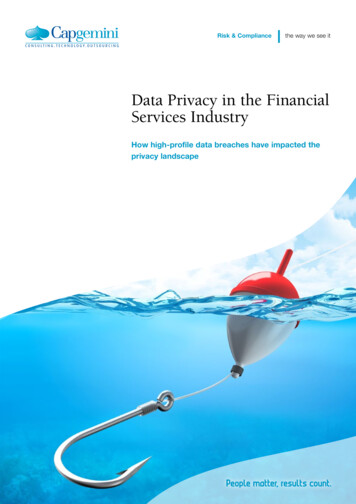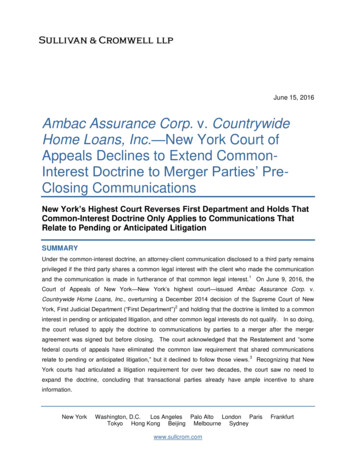
Transcription
June 15, 2016Ambac Assurance Corp. v. CountrywideHome Loans, Inc.—New York Court ofAppeals Declines to Extend CommonInterest Doctrine to Merger Parties’ PreClosing CommunicationsNew York’s Highest Court Reverses First Department and Holds ThatCommon-Interest Doctrine Only Applies to Communications ThatRelate to Pending or Anticipated LitigationSUMMARYUnder the common-interest doctrine, an attorney-client communication disclosed to a third party remainsprivileged if the third party shares a common legal interest with the client who made the communicationand the communication is made in furtherance of that common legal interest.1On June 9, 2016, theCourt of Appeals of New York—New York’s highest court—issued Ambac Assurance Corp. v.Countrywide Home Loans, Inc., overturning a December 2014 decision of the Supreme Court of New2York, First Judicial Department (“First Department”) and holding that the doctrine is limited to a commoninterest in pending or anticipated litigation, and other common legal interests do not qualify. In so doing,the court refused to apply the doctrine to communications by parties to a merger after the mergeragreement was signed but before closing. The court acknowledged that the Restatement and “somefederal courts of appeals have eliminated the common law requirement that shared communicationsrelate to pending or anticipated litigation,” but it declined to follow those views.3Recognizing that NewYork courts had articulated a litigation requirement for over two decades, the court saw no need toexpand the doctrine, concluding that transactional parties already have ample incentive to shareinformation.New YorkWashington, D.C.Los Angeles Palo Alto London ParisTokyo Hong Kong Beijing Melbourne Sydneywww.sullcrom.comFrankfurt
Ambac clarifies that New York’s common-interest doctrine applies only to communications related topending or anticipated litigation, and that the doctrine likely will not apply in the case of other legalcommon interests, including, as was the case in Ambac, a host of common pre-closing communicationsbetween merger parties (e.g., communications related to disclosures and regulatory compliance).Nevertheless, Ambac leaves unanswered a number of important questions, including when New York’scommon-interest doctrine will apply (as opposed to less restrictive versions of the doctrine adopted insome other jurisdictions) and when a communication qualifies as being related to pending or anticipatedlitigation. Because privilege determinations are often highly context-specific, we encourage transactingparties to consult with their counsel as to the applicability of privilege to their circumstances.BACKGROUNDAmbac arises from a lawsuit in the Commercial Division of the Supreme Court of New York, New YorkCounty, by Ambac Assurance Corporation, a financial-guaranty insurer, against Countrywide HomeLoans, Inc. and certain affiliates and Bank of America Corp. In that suit, Ambac alleged that Countrywidefraudulently induced it to insure payments on residential mortgage-backed securities from 2004 through2006. Ambac claimed that Bank of America, which merged with Countrywide in 2008, was liable forCountrywide’s conduct as its successor-in-interest.In connection with its successor liability claims, Ambac sought disclosure of several hundred documentsreflecting communications between Bank of America and Countrywide and their counsel following theirentry into a merger agreement in January 2008 until the close of the merger in July 2008. Bank ofAmerica resisted disclosure, arguing that the documents were protected under the common-interestdoctrine and were shared by the parties “to ensure their accurate compliance with the law and to advancetheir common legal interests in resolving the many legal issues necessary for successful completion ofthe merger.”4A special master subsequently ordered production of the documents and the CommercialDivision Justice denied Bank of America’s motion to vacate the order, reasoning that there must be “areasonable anticipation of litigation for the common-interest doctrine to apply” and none was present5here. Bank of America appealed.On December 4, 2014, the First Department reversed, holding that “pending or reasonably anticipatedlitigation is not a necessary element of the common-interest privilege.”6Although recognizing that otherNew York courts had applied a pending-or-prospective-litigation requirement (but the Court of Appealshad not addressed the issue), the First Department found the requirement inconsistent with the purposesof the attorney-client privilege and with the weight of authority. The court observed that the purpose ofthe attorney-client privilege is “to encourage full and frank communication between attorneys and theirclients and thereby promote broader public interests in the observance of law and administration ofjustice,” a purpose that applies equally in both litigation and non-litigation contexts.7“[A]dvice is often-2Ambac Assurance Corp. v. Countrywide Home Loans, Inc.—New York Court of Appeals Declines toExtend Common-Interest Doctrine to Merger Parties’ Pre-Closing CommunicationsJune 15, 2016
sought, and rendered, precisely to avoid litigation, or facilitate compliance with the law, or simply to guidea client’s course of conduct.”8The court held that the doctrine could apply to pre-closing communications between Bank of America andCountrywide and their counsel because the communications between the parties included advice ofcounsel to one or both parties exchanged in furtherance of a common legal interest “to accuratelynavigate the complex legal and regulatory process involved in completing the transaction.”Department subsequently granted Ambac leave to appeal to the Court of Appeals.9The First10THE COURT OF APPEALS’ DECISIONOn June 9, 2016, the Court of Appeals reversed, holding that, “as the courts in New York have held forover two decades,” a communication must “relate to litigation, either pending or anticipated,” for thecommon-interest doctrine to apply.11Writing for a majority of the court, Judge Eugene F. Pigott, Jr.explained that the common-interest doctrine is not coextensive with the attorney-client privilege but rathera “distinct, exception to the general rule that the presence of a third party destroys any claim ofprivilege.”12The doctrine originated in the criminal law, allowing criminal co-defendants to shareconfidential information about defense strategy.13Over time, New York courts applied the doctrine toboth criminal and civil matters, including to communications of co-plaintiffs and co-defendants.14Prior tothe First Department’s decision in Ambac, however, New York courts had “uniformly rejected efforts toexpand the common-interest doctrine to communications that do not concern pending or reasonablyanticipated litigation.”15Although recognizing that the Restatement, Delaware, and some federal courts of appeal have concludedthat the common-interest doctrine applies outside a litigation context, the Court of Appeals declined tofollow suit.16The court’s rationale for a litigation requirement was rooted in policy. The court reasonedthat “[w]hen two or more parties are engaged in or reasonably anticipate litigation in which they share acommon legal interest, the threat of mandatory disclosure may chill the parties’ exchange of privilegedinformation and therefore thwart any desire to coordinate legal strategy.”17In those situations, the courtreasoned, the common-interest doctrine “promotes candor that may otherwise have been inhibited.”18The court concluded that the same considerations are not present when parties share a common legalinterest in a commercial transaction but do not reasonably anticipate litigation.19As support, the courtnoted that corporate transactions had flourished in New York even though New York courts hadrecognized a litigation requirement in the common-interest doctrine for decades.20The court concludedthat the costs of an expanded doctrine—“the substantial loss of relevant evidence, as well as the potential21for abuse” —outweighed the benefits and supported its decision to “maintain the narrow constructionthat New York courts have traditionally applied.”22-3Ambac Assurance Corp. v. Countrywide Home Loans, Inc.—New York Court of Appeals Declines toExtend Common-Interest Doctrine to Merger Parties’ Pre-Closing CommunicationsJune 15, 2016
Judge Jenny Rivera filed a dissenting opinion. Judge Rivera would have expanded the common-interestdoctrine to situations like Ambac consistent with decisions in other jurisdictions that hold that thedisclosure of privileged advice in furtherance of a common legal interest does not waive the privilege.Judge Rivera argued that “important interests [are] served by the free flow of information between partieswith a common legal interest, even without the threat of litigation.”23IMPLICATIONSThe Court of Appeals’ decision clarifies the elements of New York’s common-interest doctrine. Now,under New York law, an attorney-client communication made in the presence of or disclosed to a thirdparty represented by separate counsel will remain privileged only if (1) the third party shares a commonlegal interest with the client who made the communication, (2) the communication is made in furtheranceof that common legal interest, and (3) the communication relates to pending or anticipated litigation.24Under Ambac, the doctrine likely will not apply in other settings where parties share non-litigation-relatedcommon legal interests, including what had been routine pre-closing communications between mergerparties, such as those at issue in Ambac: filing disclosures, securing regulatory approvals, reviewingcontractual obligations to third parties, maintaining employee benefit plans, and obtaining legal advice ontax consequences.25While the court in Ambac narrowed the scope of the common-interest privilege (as compared to the FirstDepartment’s ruling), it did note that New York recognizes at least two separate, distinct exceptions to thegeneral rule of third-party waiver: When a third party’s presence “is deemed necessary to enable the attorney-client communication and26the client has a reasonable expectation of confidentiality.”The federal courts have likewise longgenerally accepted that translators and, in some cases, accountants and other experts necessary tofacilitate the rendition of legal advice (but not hired to render, for example, accounting services to theclients) do not destroy the privilege. “[W]hen one attorney represents multiple clients concerning a matter of common interest.” Ambacmakes clear that, in this situation, there is no requirement that a communication relate to pending oranticipated litigation for a communication to remain privileged. “In the joint client or co-clientsetting . . . the clients indisputably share a complete alignment of interests in order for the attorney,ethically, to represent both parties. Accordingly, there is no question that the clients share a common28identity and all joint communications will be in furtherance of that joint representation.”27While Ambac establishes the elements of New York’s common-interest doctrine, it also leaves a numberof open issues: Ambac is a decision by New York’s highest court, and thus is a definitive statement of the commoninterest doctrine under New York law. Ambac recognizes, however, that a number of federal courts(including the Third Circuit, Seventh Circuit, and Federal Circuit) and some states (includingDelaware) have declined to impose any litigation requirement in connection with the common-interest29doctrine. State law applies in federal diversity cases (except where the proof is directed to an issue30that is governed by federal law). To determine which state’s law of privilege applies, a court must31apply the choice-of-law rules prevailing in the state in which the court sits, which often involves an-4Ambac Assurance Corp. v. Countrywide Home Loans, Inc.—New York Court of Appeals Declines toExtend Common-Interest Doctrine to Merger Parties’ Pre-Closing CommunicationsJune 15, 2016
analysis of the contacts of the communication with the state in question. New York’s commoninterest doctrine will thus apply in diversity cases only if the forum state’s choice-of-law principles sodictate. Given this complexity, transaction parties considering sharing communications that implicatecommon-interest doctrine issues might wish to be conservative and assume that New York’srestrictive approach potentially might apply in any situation in which that is a plausible possibility. Ambac expressly declines to decide “what it means to share common legal interests in pending or32anticipated litigation.”The court held “only that such litigation must be ongoing or reasonablyanticipated, and the exchanged communication must relate to it, in order for the common interest33exception to apply.”This language is very similar to the articulation of the attorney work-productdoctrine (a separate doctrine that protects from disclosure certain materials “prepared in anticipation34of litigation or for trial” ), which in New York requires that the material has been “prepared primarily ifnot solely for litigation,” not “in the ordinary course of business” or “to aid defendant in the operation35of its business.”In a transactional setting, some federal courts have found the common-interestdoctrine applicable when the parties are likely to be involved in “joint anticipated litigation” after the36closing of the transaction.For example, one court applied the doctrine to the sharing of a patentopinion letter where “the odds were quite strong” that both buyer and seller would be defending the37same patent in post-closing litigation, but refused to apply it to the pre-closing exchange of abstractssummarizing one party’s pending litigation because “there appears little to indicate that [the parties]38might ever engage in joint litigation.” Ambac does not address who retains control over pre-merger communications protected by thecommon-interest privilege after the close of the merger. The general rule is that rights to privileged39communications pass to the purchaser upon the close of a merger. The seller thus risks losing anycontrol over communications subject to the common-interest privilege after the close of the merger.Delaware courts have held that parties to a merger agreement can agree to limit the purchaser’spost-merger rights to certain privileged communications, and selling parties might wish to carefully40delineate those rights even in the absence of specific guidance from New York courts. Even under New York’s now-limited version of the common-interest doctrine, questions of whetherthe doctrine can apply, or if it applies to particular documents, are necessarily context-specific, andtransaction parties should consult counsel for specific advice. Taking certain steps might be helpful inpreserving the ability to invoke the common-interest doctrine, including: Contemporaneous documentation. Contemporaneous documentation of the basis for thecommon-interest privilege and the parties’ intent to preserve it can often be more persuasiveto courts than explanations provided after the privileged communications have been shared. Confidentiality. Communications are generally not privileged unless kept confidential betweenthe attorney and client. Transaction parties might bolster their ability to invoke the commoninterest doctrine by such measures as executing confidentiality agreements, limiting theindividuals receiving the communications to those strictly necessary in connection with thelitigation or anticipated litigation, placing time limits on the ability to access thecommunications, and placing constraints on distribution (e.g., prohibiting copying orforwarding of the communications, or requiring that the privileged communications be41reviewed in a facility with limited access).-5Ambac Assurance Corp. v. Countrywide Home Loans, Inc.—New York Court of Appeals Declines toExtend Common-Interest Doctrine to Merger Parties’ Pre-Closing CommunicationsJune 15, 2016
Limitation to common legal interests. Courts addressing the common-interest doctrinefrequently assess whether the interest being furthered was a “legal” or “business” interest,and have held that merely furthering common business interests does not invoke theprotections of the doctrine. Under Ambac, the doctrine is limited to a common interest inpending or anticipated litigation, which will typically qualify as a legal interest. Even so,transaction parties might strengthen their common-interest privilege claims bycontemporaneously documenting the legal interest that is to be furthered (includingidentifying the litigation or anticipated litigation), by advising transaction participants tosegregate their privileged communications from more general business communications, andby limiting those privy to the privileged communications to counsel and others necessary tofurthering the common legal interest.***Copyright Sullivan & Cromwell LLP 2016-6Ambac Assurance Corp. v. Countrywide Home Loans, Inc.—New York Court of Appeals Declines toExtend Common-Interest Doctrine to Merger Parties’ Pre-Closing CommunicationsJune 15, 2016
ENDNOTES1Ambac Assurance Corp. v. Countrywide Home Loans, Inc. (Ambac III), No. 80, slip op. at 2 (N.Y.June 9, 2016).2See S&C Publication Ambac Assurance Corp. v. Countrywide Home Loans, Inc.: New YorkAppellate Court Applies Common-Interest Privilege to Merger Parties’ Pre-ClosingCommunications (Dec. 10, 2014).3Ambac III, No. 80, slip op. at 20-21.4Ambac Assurance Corp. v. Countrywide Home Loans, Inc. (Ambac II), Index No. 651612/10, slipop. at 4 (1st Dep’t Dec. 4, 2014).5Ambac Assurance Corp. v. Countrywide Home Loans, Inc., 2013 WL 5629595, at *1-2 (Sup. Ct.,N.Y. Cnty. Oct. 16, 2013).6Ambac II, Index No. 651612/10, slip op. at 2.7Id. at 7 (quoting Upjohn Co. v. United States, 449 U.S. 383, 389 (1981)).8Id. at 7-8 (quoting Spectrum Sys. Int’l Corp. v. Chem. Bank, 78 N.Y.2d 371, 380 (1991)).9Id. at 14.10Ambac III, No. 80, slip op. at 7.11Id. at 2.12Id. at 8-9 (emphasis in original).13Id. at 10.14Id. at 13.15Id. (citing cases).16Id. at 20 (citing Restatement (Third) of the Law Governing Lawyers § 76(1) (1997); In reTeleglobe Commc’ns Corp., 493 F.3d 345, 364 (3d Cir. 2007); United States v. Seidman, LLP,492 F.3d 806, 816 (7th Cir. 2007); In re Regents of the Univ. of Cal., 101 F.3d 1386, 1390-91(Fed. Cir. 1996)); see also id. at 11-12 n.2 (citing Del. R. Evid. 502(b)(3)).17Id. at 15.18Id.19Id.20Id. at 15-16.21Id. at 16-17.22Id. at 22.23Id. at 6 (Rivera, J. dissenting).24Ambac III, No. 80, slip op. at 1-2.25Id. at 3-4.26Id. at 9.27Id.28Id. at 19.29Id. at 20-21 & 11-12 n.2.-7Ambac Assurance Corp. v. Countrywide Home Loans, Inc.—New York Court of Appeals Declines toExtend Common-Interest Doctrine to Merger Parties’ Pre-Closing CommunicationsJune 15, 2016
ENDNOTES (CONTINUED)30Lego v. Stratos Lightwave, Inc., 224 F.R.D. 576, 578 (S.D.N.Y. 2004) (quoting 23 Charles AlanWright & Kenneth W. Graham, Jr., Federal Practice and Procedure § 5433 (1980)).31See Klaxon Co. v. Stentor Elec. Mfg. Co., 313 U.S. 487, 496 (1941).32Ambac III, No. 80, slip. op. at 18-19 n.4.33Id.34NY CPLR 3101(d).35Christie’s, Inc. v. Zirinsky, 17 Misc. 3d 1123(A), at *3 (N.Y. Sup. Ct., N.Y. Cnty. Aug. 28, 2007)(quoting Spectrum Sys. Int’l Corp. v. Chemical Bank, 157 A.D.2d 444 (1st Dep’t 1990)).36Union Carbide v. Dow Chemical, 619 F. Supp. 1036, 1047 (D. Del. 1985).37Hewlett-Packard v. Bausch & Lomb, Inc., 115 F.R.D. 308, 310 (N.D. Cal. 1987).38Nidec Corp. v. Victor Co. of Japan, 249 F.R.D. 575, 579 (N.D. Cal. 2007).39See CFTC v. Weintraub, 471 U.S. 343, 349 (1985).40See Great Hill Equity Partners IV, LP v. SIG Growth Equity Fund I, LLLP, 80 A.3d 155, 161 (Del.Ch. 2013) (advising parties “to use their contractual freedom . . . to exclude from the transferredassets the attorney-client communications they wish to retain as their own”).41See, e.g., Tenneco Packaging Specialty & Consumer Prods., Inc. v. S.C. Johnson & Son, Inc.,1999 WL 754748, at *2 (N.D. Ill. Sept. 14, 1999) (upholding assertion of common-interestprivilege where disclosing party “took substantial steps to ensure that the opinion would remainconfidential,” including disclosing the privileged communication only to a limited number ofindividuals, each of whom agreed to abide by the confidentiality agreement).-8Ambac Assurance Corp. v. Countrywide Home Loans, Inc.—New York Court of Appeals Declines toExtend Common-Interest Doctrine to Merger Parties’ Pre-Closing CommunicationsJune 15, 2016
ABOUT SULLIVAN & CROMWELL LLPSullivan & Cromwell LLP is a global law firm that advises on major domestic and cross-border M&A,finance, corporate and real estate transactions, significant litigation and corporate investigations, andcomplex restructuring, regulatory, tax and estate planning matters.Founded in 1879, Sullivan &Cromwell LLP has more than 800 lawyers on four continents, with four offices in the United States,including its headquarters in New York, three offices in Europe, two in Australia and three in Asia.CONTACTING SULLIVAN & CROMWELL LLPThis publication is provided by Sullivan & Cromwell LLP as a service to clients and colleagues. Theinformation contained in this publication should not be construed as legal advice. Questions regardingthe matters discussed in this publication may be directed to any of our lawyers listed below, or to anyother Sullivan & Cromwell LLP lawyer with whom you have consulted in the past on similar matters. Ifyou have not received this publication directly from us, you may obtain a copy of any past or futurerelated publications from Stefanie S. Trilling ( 1-212-558-4752; trillings@sullcrom.com) in our New Yorkoffice.CONTACTSNew YorkBrian T. Frawley 1-212-558-4983frawleyb@sullcrom.comJoseph B. Frumkin 1-212-558-4101frumkinj@sullcrom.comRobert J. Giuffra Jr. 1-212-558-3121giuffrar@sullcrom.comJohn L. Hardiman 1-212-558-4070hardimanj@sullcrom.comWilliam B. Monahan 1-212-558-7375monahanw@sullcrom.comJoseph E. Neuhaus 1-212-558-4240neuhausj@sullcrom.comDavid M.J. Rein 1-212-558-3035reind@sullcrom.comMatthew A. Schwartz 1-212-558-4197schwartzmatthew@sullcrom.com-9Ambac Assurance Corp. v. Countrywide Home Loans, Inc.—New York Court of Appeals Declines toExtend Common-Interest Doctrine to Merger Parties’ Pre-Closing CommunicationsJune 15, 2016SC1:4152304.3B
County, by Ambac Assurance Corporation, a financial-guaranty insurer, against Countrywide Home Loans, Inc. and certain affiliates and Bank of America Corp. In that suit, Ambac alleged that Countrywide fraudulently induced it to insure payments on residential mortgage-backed securities from 2004 through 2006.
